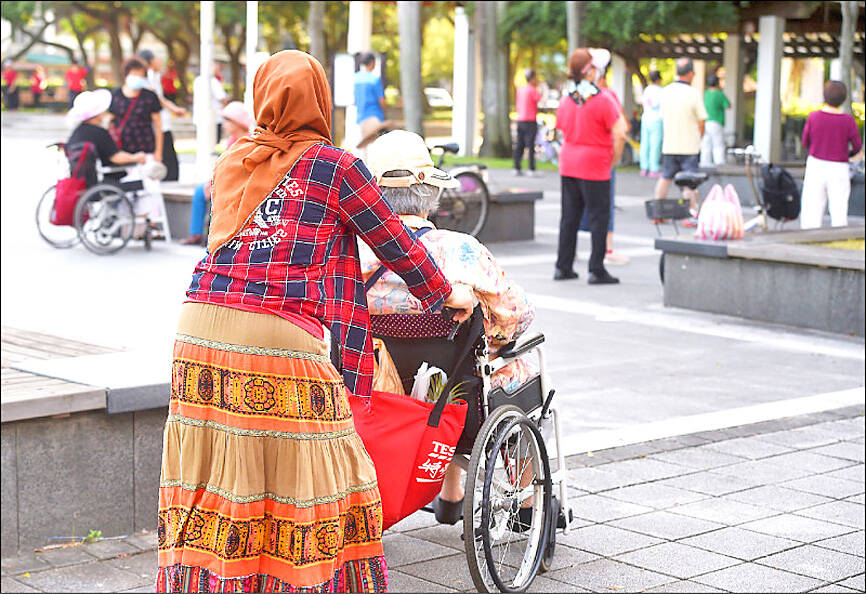The Ministry of Labor is planning to expand a waiver program for applying to hire foreign at-home caregivers by September, which is expected to benefit about 55,000 people nationwide, Deputy Minister of Labor Wang An-pang (王安邦) said yesterday.
There are 910,000 people in Taiwan aged 80 or older, and 381,000 of them require care, Wang said, citing Ministry of the Interior (MOI) statistics from March.
The Barthel Index measures a person’s ability to complete daily activities and it is a significant parameter in evaluating a family’s eligibility to hire a foreign caregiver. There have been calls to relax the criteria so that people who need full-time care do not need a Barthel Index assessment to hire foreign caregivers.

Photo: Wu Po-hsuan, Taipei Times
Wang said that the Ministry of Labor understands need to ease requirements, but if the government complied, it might affect the capacity to provide long-term caregivers for people with severe chronic issues.
The ministry hopes that its waiver program could meet the public’s needs and ease excess demand, Wang said.
Ministry of Health and Welfare statistics show that 41.7 percent of those aged 80 or older have some disability, Wang said.
The Ministry of Labor estimates that only 530,000 people aged 80 or older are healthy or semi-healthy, Wang said.
The Ministry of Labor allows three groups to apply for its waiver program: people who have used long-term healthcare programs for more than six months, those with mild cognitive impairments, and those with particular forms of physical and mental challenges.
As of April, about 62,000 applications for foreign at-home caregivers had been approved, of which 32,000 used the waiver program, Wang said.
The Ministry of Labor expects people benefiting from the waiver program to increase, Wang said.
The ministry is expanding the program, with amendments scheduled for September to include people aged 80 or older with long-term health issues, irreversible conditions of physical challenges and those who are physically challenged with a long-term record of health issues living in rural areas, Wang said.
If passed, about 55,000 people stand to benefit, Wang said.
Separately, the Legislative Yuan’s Social Welfare and Environmental Hygiene Committee yesterday held a public hearing on the hiring of foreign caregivers under the Employment Service Act (就業服務法) to hear public opinions on whether the law should be amended.
The hearing is in response to the Chinese Nationalist Party’s (KMT) proposal to amend the act and waive the Barthel Index for people who are aged 80 or above.

A magnitude 7.0 earthquake struck off Yilan at 11:05pm yesterday, the Central Weather Administration (CWA) said. The epicenter was located at sea, about 32.3km east of Yilan County Hall, at a depth of 72.8km, CWA data showed There were no immediate reports of damage. The intensity of the quake, which gauges the actual effect of a seismic event, measured 4 in Yilan County area on Taiwan’s seven-tier intensity scale, the data showed. It measured 4 in other parts of eastern, northern and central Taiwan as well as Tainan, and 3 in Kaohsiung and Pingtung County, and 2 in Lienchiang and Penghu counties and 1

FOREIGN INTERFERENCE: Beijing would likely intensify public opinion warfare in next year’s local elections to prevent Lai from getting re-elected, the ‘Yomiuri Shimbun’ said Internal documents from a Chinese artificial intelligence (AI) company indicated that China has been using the technology to intervene in foreign elections, including propaganda targeting Taiwan’s local elections next year and presidential elections in 2028, a Japanese newspaper reported yesterday. The Institute of National Security of Vanderbilt University obtained nearly 400 pages of documents from GoLaxy, a company with ties to the Chinese government, and found evidence that it had apparently deployed sophisticated, AI-driven propaganda campaigns in Hong Kong and Taiwan to shape public opinion, the Yomiuri Shimbun reported. GoLaxy provides insights, situation analysis and public opinion-shaping technology by conducting network surveillance

‘POLITICAL GAME’: DPP lawmakers said the motion would not meet the legislative threshold needed, and accused the KMT and the TPP of trivializing the Constitution The Legislative Yuan yesterday approved a motion to initiate impeachment proceedings against President William Lai (賴清德), saying he had undermined Taiwan’s constitutional order and democracy. The motion was approved 61-50 by lawmakers from the main opposition Chinese Nationalist Party (KMT) and the smaller Taiwan People’s Party (TPP), who together hold a legislative majority. Under the motion, a roll call vote for impeachment would be held on May 19 next year, after various hearings are held and Lai is given the chance to defend himself. The move came after Lai on Monday last week did not promulgate an amendment passed by the legislature that

Taiwan is gearing up to celebrate the New Year at events across the country, headlined by the annual countdown and Taipei 101 fireworks display at midnight. Many of the events are to be livesteamed online. See below for lineups and links: Taipei Taipei’s New Year’s Party 2026 is to begin at 7pm and run until 1am, with the theme “Sailing to the Future.” South Korean girl group KARA is headlining the concert at Taipei City Hall Plaza, with additional performances by Amber An (安心亞), Nick Chou (周湯豪), hip-hop trio Nine One One (玖壹壹), Bii (畢書盡), girl group Genblue (幻藍小熊) and more. The festivities are to